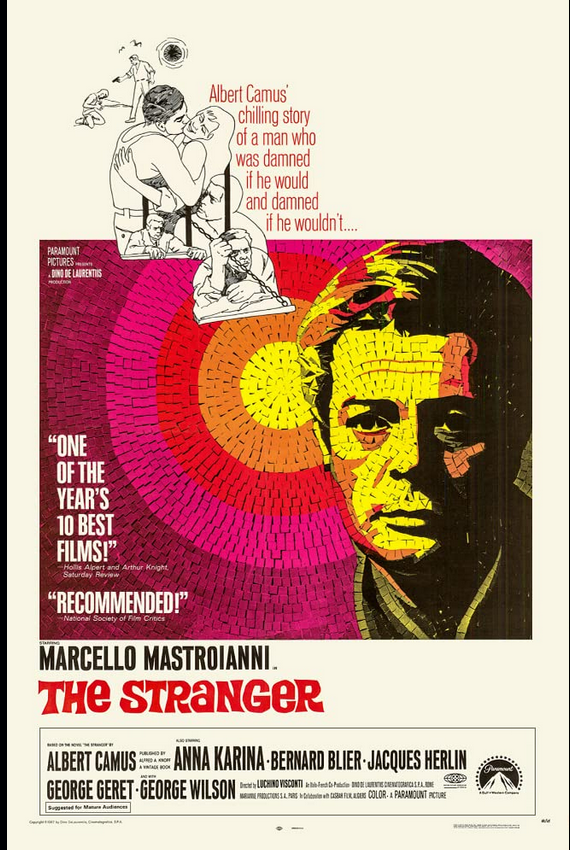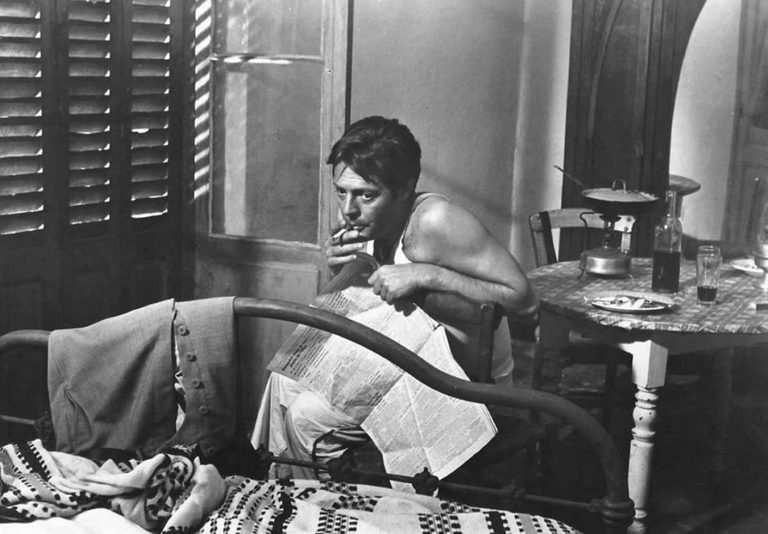Review and impressions of the movie The Foreigner with Marcello Mastroianni / Reseña e impresiones de la película El Extranjero con Marcello Mastroianni [ENG/ESP].

I have started to watch again old movies, in some cases true masterpieces of universal cinematography, that I had saved in the computer.
Today I want to talk about one of them, with a director who at the time was compared to Alfred Hitchcock himself and was considered for a long time one of the masters of Italian suspense films.
The Stranger is a 1967 film directed by Luchino Visconti and starring Marcello Mastroianni and Ana Karina in the lead roles.
It is based on The Stranger by Albert Camus from 1942 and the film script faithfully respects the author's book, as it was one of the conditions imposed to the director by Camus' widow.

As a curious fact we can add the renewed interest in the books of the Algerian-born French novelist, essayist and playwright after his death.
This led the Italian producer Dino De Laurentis, who at that time, and for decades to come, exercised a kind of monopoly over the Italian film industry, to buy the rights respecting the will of Francine Camus, the writer's widow, who imposed a trusted collaborator to ensure that the film adaptation was a faithful reflection of the book.
Initially, Alain Delon and Claudia Cardinal were destined to play the main roles, but they were left aside, according to comments at the time, due to the pressure exerted by Francine Camus, who objected - without detracting from the quality of the actors chosen a priori - that Alain Delon was too young for the character in the novel (Arthur Meursault) and Claudia Cardinale was too beautiful to play Marie Cardona.
Marcello Mastroianni and Anna Karina were thus chosen to replace them.

Como dato curioso podemos agregar el renovado interés por los libros del novelista, ensayista, dramaturgo francés nacido en Argelia después de su muerte.
Esto llevó a que el productor italiano Dino De Laurentis, que en ese momento, y por décadas sucesivas, ejerció una especie de monopolio sobre la industria cinematográfica italiana, comprara los derechos respetando la voluntad de Francine Camus, la viuda del escritor que le impuso un colaborador de confianza para controlar que la adaptación cinematográfica fuera un fiel reflejo del libro.
Para desempeñar los roles principales estaban destinados en un inicio Alain Delon y Claudia Cardinal, pero fueron dejados de lado, según comentarios de la época, por la presión ejercida por Francine Camus, quien objetó -sin desmerecer la calidad de los actores elegidos a priori- que Alain Delon era demasiado joven para el personaje de la novela (Arthur Meursault) y Claudia Cardinale era demasiado hermosa para representar a Marie Cardona.
De esta manera se eligió a Marcello Mastroianni y Anna Karina para reemplazarlos.

He comenzado a ver de nuevo viejas películas, en algún caso verdaderas obras maestras de la cinematografía universal, que tenía guardadas en la computadora.
Hoy les quiero hablar sobre una de ellos, con un director que en su momento fue comparado con el mismo Alfred Hitchcock y fue considerado por mucho tiempo por uno de los maestros en el cine de suspenso italiano
El Extranjero es una película del año 1967 dirigida por Luchino Visconti e interpretada por Marcello Mastroianni y Ana Karina en los roles principales.
Está basada The Stranger de Albert Camus de 1942 y el guion cinematográfico respeta fielmente el libro del autor, ya que fue una de las condiciones impuestas, al director, por la viuda de Camus.

Arthur Meursault (played by Marcello Mastroianni), is a modest office worker who lives and works in Algiers, but he is also a person who lives as if he does not care about anything in the outside world.
When he receives the news of his mother's death in a hospice, he takes it as a natural fact without even being saddened, but considers it his duty as a son to accompany her remains to the cemetery.
In these circumstances, of total apathy, he meets Marie, a typist friend with whom he begins a relationship. Although the feelings of that relationship do not commit him beyond the company that the woman represents.
One of his neighbors, Raymond, who in reality lives thanks to the women he convinces, even by force, to prostitute themselves, befriends Meursault. This kind of friendship does not interest him much either, but he accepts it nonetheless, just as he accepts the fact that his new friend mistreats the women when they do not want to prostitute themselves or do not give him the money he asks for.
On one occasion, Meursault hears screams coming from his friend's apartment and when he arrives he discovers that his friend is beating an Arab girl. This vision does not surprise him either and he accepts it as a matter of course.
He even continues to see Raymond, who tells him that he is not too calm, since after the beating of the girl, his brother is following him through the streets, silently, from afar, apparently with the pretext of looking for an opportunity to attack him and take revenge in the name of his sister.
One Sunday Meursault, Marie and Raymond go to the beach and find the Arab. Meursault, in a gesture of madness that he will never understand, shoots the Arab several times until he finds that he is indeed dead.
Arrested and tried, he is condemned to death without even the slightest hint of defending himself. When he is asked to justify his act, he does not know how to justify it, he simply says that it was the only way out in this situation, accepting the crime and the punishment imposed.
Perhaps he has realized that what he has truly lost is his insensitivity to the human condition, assuming in fact an "outsider" character in the society of which he is a part.
Hence the title of stranger should be understood not in the strict sense of his nationality, but rather his behavior in a society of which he is a part, but of which he fails to understand its true values. Hence the concept of "stranger". In Italy it was premiered under the name of "Lo Straniero" which also has a double meaning, but the most appropriate for the play is in English: "The Stranger" where the word can be translated more in the sense of "unknown" or "stranger".

Arthur Meursault (interpretado por Marcello Mastroianni), es un modesto oficinista que vive y trabaja en Argel, pero también es una persona que vive como si no le importara nada del mundo externo.
Cuando recibe el nuncio de la muerte de su madre en un hospicio, lo toma como un hecho natural sin entristecerse siquiera, pero considera que su deber como hijo es acompañar sus restos hasta el cementerio.
En esas circunstancias, de total apatía conoce a Marie, una mecanógrafa amiga con la cual inicia una relación. Aunque tampoco los sentimientos de esa relación lo comprometen más allá de la compañía que representa la mujer.
Uno de sus vecinos, Raymond, que en realidad vive gracias a las mujeres a las cuales convence, incluso por la fuerza, a prostituirse, se hace amigo de Meursault. Tampoco este tipo de amistad le interesa demasiado, pero, no obstante todo la acepta, como acepta el hecho de que su nuevo amigo maltrate a las mujeres cuando no se quieren prostituir o no le dan el dinero que les pide.
En una oportunidad, Meursault escucha gritos provenientes del departamento de su amigo y cuando llega descubre que este esté golpeando a una muchacha árabe. Tampoco esta visión lo sorprende y la acepta en modo natural.
Incluso continúa viéndose con Raymond, quien le comenta que no está demasiado tranquilo, ya que después de la golpiza a la chica, su hermano lo está siguiendo por las calles, en silencio, desde lejos, aparentemente con el pretexto de buscar el lugar oportunidad para atacarlo y vengarse en nombre de su hermana.
Un domingo Meursault, Marie y Raymond van a la playa y encuentran al árabe. Meursault, en un gesto de locura que luego ni siquiera llegará a comprender, dispara al árabe varias veces hasta comprobar que está efectivamente muerto.
Detenido y juzgado, es condenado a muerte sin que ni siquiera atisbe a defenderse. Cuando le piden una justificación a su acto, no sabe darla, dice simplemente que era la única salida en esa situación, aceptando el crimen y el castigo impuesto.
Tal vez se ha dado cuenta de que lo que ha perdido verdaderamente es su insensibilidad a la condición humana, asumiendo de hecho un carácter de "extraño" en la sociedad de la que forma parte.
De ahí que el título de extranjero deba entenderse no en el sentido estricto de su nacionalidad, sino más a bien a su comportamiento en una sociedad de la que hace parte, pero de la cual no logra entender sus verdaderos valores. De ahí el concepto de "extraño". En Italia fue estrenada con el nombre de "Lo Straniero" que también tiene un doble significado, pero él más justo para la obra es en inglés: "The Stranger" donde la palabra puede ser traducida más con el sentido de "desconocido" o "extraño".


| Directed by / Dirigida por | Luchino Visconti |
|---|---|
| Arthur Meursault | Marcello Mastroianni |
| Marie Cardona | Anna Karina |
| Raymond | Georges Géret |
| Judge / Juez | Pierre Bertin |
| Priest / Sacerdote | Bruno Crémer |
| Masson | Mimmo Palmara |
| Madame M | Angela Luce |

As often happens, the book is superior to the film, but the film should not be considered a quality product.
The lack of humanity in the central character is less of a point than Camus does in the book, but the performances of Mastroianni and Karina are excellent, especially the former who with his charisma manages to identify perfectly with an absolutely amoral character, for whom everything goes well and who does not know the difference between good and evil. Between the morally acceptable and the immoral.
Visconti, a true master in these matters, uses an almost didactic language, very simple, ambiguous, disturbing, because he obviously knows that the expressions of Marcello Mastroianni and Anna Karina are a real guarantee to convey to the characters of Camus' novel all their identity (or lack thereof).

Como sucede a menudo, el libro es superior a la película sin que por esto deba considerarse a la película como un producto de calidad.
Apunta menos a la falta de humanidad en el personaje central de como lo hace Camus en el libro, pero de igual manera la actuación de Mastroianni y Karina son excelentes, especialmente el primero que con su carisma logra identificarse perfectamente con un personaje absolutamente amoral, para el cual todo va bien y que no sabe distinguir la diferencia en el bien y el mal. Entre lo moralmente aceptable y lo inmoral.
Visconti, un verdadero maestro en estas lides, usa un lenguaje casi didáctico, muy simple, ambiguo, inquietante, porque evidentemente sabe que las expresiones de Marcello Mastroianni y Anna Karina son una verdadera garantía para transmitir a los personajes de la novela de Camus toda su identidad (o la falta de la misma)

The paragraph separator -adapted- is the property of The Peak Studio to whom I am grateful for the kind permission to use it.
El separador de párrafos -adaptado- es propiedad de The Peak Studio a quien agradezco la gentil concesión de uso.
Your content has been voted as a part of Encouragement program. Keep up the good work!
Use Ecency daily to boost your growth on platform!
Support Ecency
Vote for new Proposal
Delegate HP and earn more
https://twitter.com/HugoRep/status/1522273854248345607
The rewards earned on this comment will go directly to the person sharing the post on Twitter as long as they are registered with @poshtoken. Sign up at https://hiveposh.com.
That's an interesting review! While already not super into new movies, my old movies' knowledge is completely inexistent so I haven't watched it - but it does seem really interesting!
!1UP
You have received a 1UP from @mezume!
@cine-curator, @neoxag-curator, @pal-curatorAnd they will bring !PIZZA 🍕
Learn more about our delegation service to earn daily rewards. Join the family on Discord.
!PIZZA
PIZZA Holders sent $PIZZA tips in this post's comments:
@aurikan(4/5) tipped @greengalletti (x1)
Please vote for pizza.witness!
Agregado a lista de pendientes, gracias :D